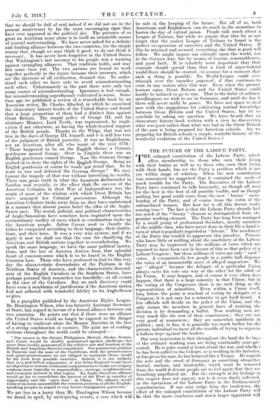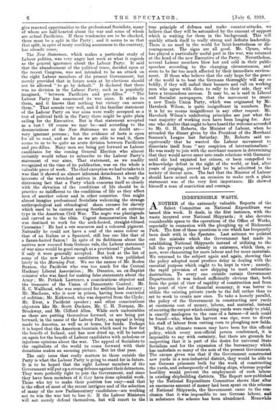THE FUTURE OF THE LABOUR PARTY. T HE enlarged constitution of
the Labour Party, which offers membership to those who earn their living with their brains as well as to those who earn their living with their hands, has set the Party a problem which is not yet within range of solution. When the new constitution was announced we suggested that it contained the seeds of much trouble for the Party. The Executive of the Labour Party have continued to talk buoyantly, as though all were for the best in the best of all possible worlds, and as though nothing but good could come from the new " brainy " mem- bership of the Party, and of course from the votes of the enfranchised women. But how far is all this dream really coming true ? The fact is that the Labour Party already had too much of the " brainy " element as distinguished from the genuine working element. The Party has long been managed by a small group of professional Socialists, mostly members of the middle class, who have never done in their life a hand's- turn of what is popularly regarded as " labour." The machinery of the Party has tended to aggravate this paradox. Persons who know little or nothing about the machinery of the Labour Party may be impressed by the millions of votes which are reported to have been cast in favour of this or that policy at a Labour Congress ; but these millions of votes are only card " votes. A comparatively few people in a public hall dispense the votes of an innumerable army of alleged supporters. We say " alleged " because the delegate of a particular Union always casts his vote one way or the other for the whole of his Union. It may happen, and of course it very often does happen, that there is a large minority in that Union; but in the voting of the Congresses there is no such thing as the representation of minorities. Even within a Union itself, long before the point is reached of voting by delegate at a Congress, it is not easy for a minority to get itself heard. A few officials will decide on the policy of the Union, and the only means the members in general have of resisting the decision is by demanding a ballot. Now working men are very much like the rest of their countrymen ; they are not very good at manoeuvre ; they are somewhat apathetic in politics ; and, in fine, it is generally too much bother for the private individual to incur all the trouble of trying to organize a forlorn hope against the leaders.
Our own impression is that throughout the land the feelings of the ordinary working man are being continually misrepre- sented. He is quite sound at heart about the war, and whether he has been called to the Colours, or is working in the factories, or has given his sons, he has behaved like a Trojan. He regards the acts and the creed of Germany as something altogether bestial, unclean, and intolerable, which must be removed from the world if decent people are to feel again that they are breathing unpolluted air. But the strength of his feelings in this respect does not appear, nor is it even dimly reflected, in the operations of the Labour Party in the Parliamentary Constituencies. If one may judge from the tendencies, the effect of the enlarged constitution of the Labour Party will be that the more cumbrous and much larger apparatus will give renewed opportunities to the professional Socialists, many of whom are half-hearted about the war and some of whom are actual Pacificists. If these tendencies are to be checked, there must be a split in the Party ; and it seems to us that that split, in spite of many soothing assurances to the contrary, has already come; The New Statesman, which makes a particular study of Labour politics, was very angry last week at what it regards as the general ignorance about the Labour Party. It said that the abandonment of the political truce, decided upon at the recent Congress, was not intended to be an attack on the eight Labour members of the present Government, but merely provided that in future seats at by-elections should not be allowed " to go by default." It declared that there was no division in the Labour Party, such as is popularly imagined, " between Pacificists and pro-Allies.' " The Labour Party has announced its war aims. It sticks to them, and it knows that nothing but victory can secure them." That sounds very well, and if the familiar statement of the Labour Party on war aims were really accepted as a test of political faith in the Party there might be quite plain sailing for the Executive. But is that statement accepted as a test I Of course we may be—and according to the denunciations of the New Statesman we no doubt are— very ignorant persons ; but the evidence of facts is open for all to read, and so far as we are able to read it, there seems to us to be quite an acute division between Pacificists and pro-Allies. Many men are being put forward as Labour candidates for the coming General. Election who almost certainly would refuse to subscribe to the Labour Party's statement of war aims. That statement, as we readily recognized at the time of its publication, was on the whole a valuable piece of work. The chief exception we had to take to it i was that it showed an almost inhuman detachment about the interests of the wretched natives in Africa. It is really a distressing fact that a Party which concerns itself so closely with the elevation of the conditions of life should be in practice so indifferent to the conditions of life as they affect men of another colour and in other countries. One might almost imagine professional Socialists welcoming the strange anthropological and ethnological sham excuses for slavery which used to be current among Southerners of an extreme type in the American Civil War. The negro was plantigrade and curved as to the tibia. Cogent demonstration that he was destined to work for the arch-footed, straight-tibiaed Caucasian ! He had a rote mucosum and a coloured. pigment. Naturally he could not have a soul of the same colour as that of an Italian or a Spaniard, still less one like that of a flaxen-haired Saxon I In spite of its flabbiness about the natives now rescued from German rule, the Labour statement of war aims would be good enough as a provisional " platform " if only it were generally accepted. But look at the list of some of the new Labour candidates which was published lately in the Morning Post. We see the names of Mr. Roden Buxton, the Pacificist who was too much for the Central Hackney Liberal Association ; Mr. Dunnico, an ex-Baptist minister who was fined for making false statements about the Army ; Mr. Pethick Lawrence, a conscientious objector and the treasurer of the Union of Democratic Control ; Mr. R. C. Wellhead, who was sentenced for sedition last January • Mr. MacLean, who is now in prison, having been convicted of sedition; Mr. Kirkwood, who was deported. from the Clyde ; Mr. Ewer, a Pacificist speaker ; and other conscientious objectors like Mr. Scott Duckers, Mr. C. H. Norman, Mr. Brockway, and Mr. Clifford Allen. While such undesirables as these are putting themselves forward, or are being put forward,- in the name of the Labour Party, an appeal is being made to America, as well as at home, for funds. Perhaps it is hoped that the American fountain which used to flow for the benefit of Ireland, and has now dried up, will be turned on again for the benefit of Labour candidates with nebulous or injurious opinions about the war. The appeal of Socialists to the capitalists of the world to come forward with their donations makes an amusing picture. But let that pass.
The only issue that really matters to those outside the Party is what the Labour Party is going to stand for in future. It is to be hoped that the eight Labour members of the Government will put up a strong defence against their detractors. They were perfectly right to join the Government, and since they have been members of it they have done splendid work. Those who try to make their position less easy—and that is the effect of most of the recent intrigues and of the selection of many of the new Parliamentary candidates—are working not to win the war but to lose it. If the Labour Ministers will not merely defend themselves, but will resort to the true principle of defence and make counter-attacks, we believe that they will be astonished by the amount of support which is waiting for them in the background. This will quickly attach itself to really strong and definite leadership. There is no need in the world for faint-heartedness or dis- couragement. The signs are all good. Mr. Clynes, who has played a particularly useful part in the war, was returned at the head of the new Executive of the Party. Nevertheless, several Labour members blow hot and cold in their public speeches according to the changing circumstances, and seem to be far too much affected by their immediate environ- ment. If those who believe that the only hope for the peace of the world is to beat the Germans thoroughly will say so boldly, if they will unfurl their banners and call on working men who agree with them to rally to their side, they will have a tremendous success. It may be, as is said in Liberal and Socialist newspapers, that the movement to create a new Trade Union Party, which was originated by Mr. Havelock Wilson, is quite insignificant in numbers. But it is by no means insignificant in any other respect. Mr. Havelock Wilson's unfaltering principles are just what the vast majority of working men have been longing for. Any one who doubts that ought to have heard the welcome accorded to Mr. G. H. Roberts, the Minister of Labour, when he attended the dinner given by the President of the Merchant Seamen's League last Saturday. Mr. Roberts said un- equivocally that he wanted the Labour movement to dissociate itself from " any suspicion of internationalism." Ho was ready to join with the merchant seamen in determining that they would never enter into trade relations with Germany until she had expiated her crimes, or been compelled to acknowledge defeat in the sight of the world, or had, after years of purging, proved her right to be admitted to the society of decent men. The fact that the Minister of Labour should have seized such an occasion to make such a plain statement was of the very first importance. He showed himself a man of conviction and courage.











































 Previous page
Previous page